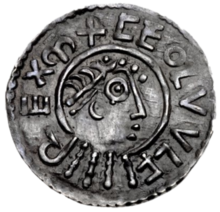| Ceolwulf I | |
|---|---|
 | |
| King of Mercia | |
| Reign | 821–823 |
| Predecessor | Coenwulf |
| Successor | Beornwulf |
| Spouse | Unknown |
| Issue | Ælfflæd of Mercia |
| House | C-dynasty |
| Father | Cuthberht of Mercia |
| Mother | Unknown |
Ceolwulf I was the King of Mercia, a kingdom of Anglo-Saxon England, from 821 until his deposition in 823. He was the brother of Coenwulf, his predecessor, and was deposed by Beornwulf. [1]
Contents
William of Malmesbury declared that, after Cœnwulf: "the kingdom of the Mercians declining, and if I may use the expression, nearly lifeless, produced nothing worthy of historical commemoration." Actually, Mercia did have a moment of glory that William was unaware of. Indicating the year 822, the Annales Cambriae states: "The fortress of Degannwy (in Gwynedd) is destroyed by the Saxons and they took the kingdom of Powys into their own control."
A later charter depicts a disturbed state of affairs during Ceolwulf's reign: "After the death of Cœnwulf, king of the Mercians, many disagreements and innumerable disputes arose among leading persons of every kind—kings, bishops, and ministers of the churches of God—concerning all manner of secular affairs". In 823, sometime after 26 May, on which date he granted land to Archbishop Wulfred in exchange for a gold and silver vessel, Ceolwulf was overthrown. His replacement was Beornwulf, whose pedigree is not known. [2]
Ceolwulf ruled Kent directly—in his two charters, he is styled as "King of the Mercians and of the men of Kent". [3]

